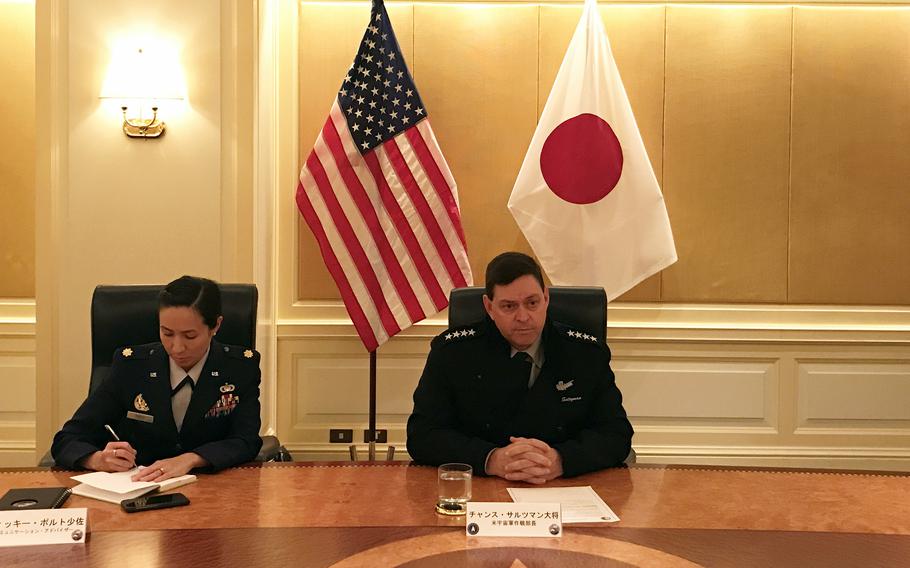
Space Force Gen. Chance Saltzman, chief of space operations, speaks to reporters at the New Sanno Hotel in Tokyo, Monday, Sept. 25, 2023. (Seth Robson/Stars and Stripes)
TOKYO — The U.S. Space Force is expanding its presence in Japan with the transfer of an Army missile-tracking unit and possibly establishing a headquarters in the allied country, the Space Force commander told reporters Monday.
“Space is critical to modern warfare,” Gen. Chance Saltzman, chief of space operations, said during a press conference at the New Sanno Hotel.
The number of personnel and type of facilities needed to establish a headquarters in Japan are being assessed, he said.
Potential locations in western Tokyo include Fuchu Air Base, home of Japan’s Space Operations Group and Yokota Air Base, home of U.S. Forces Japan and Japan Air Defense Command, Saltzman said.
“What are the tasks that we want the Guardians to accomplish and where is the best place for them to do that?” he asked.
Saltzman, who took command of the Space Force in November, visited Fuchu on Friday and Misawa Air Base in northeastern Japan on Saturday, Col. Greg Hignite, spokesman for U.S. Forces Japan, said in a text message Monday.
Misawa is home to the Joint Tactical Ground Station, Delta Detachment, an element of the Army’s 1st Space Battalion, 1st Space Brigade; its mission is to provide “in-theater missile warning,” according to Misawa’s website.
“If we went up there today you would see Space Force Guardians working side-by-side with the soldiers,” Saltzman said.
The detachment of about 25 personnel will transfer to the Space Force on Sunday, he said.
North Korea since 2017 has tested several intercontinental ballistic missiles that arced over portions of Japan. The tests demonstrated that a weapon from nuclear-armed North Korea could reach the continental United States.
Space cooperation with Japan involves the U.S. sharing information about the rest of the world and Japan giving America a better picture of what’s going on in the space domain, Saltzman said.
Aggressive behavior by the Chinese toward Taiwan has the Space Force’s attention, but conflict is not inevitable, according to Saltzman. “Competition is preferable to crisis or conflict,” he said.
The way to avoid a crisis is to be aware of what the Chinese are trying to accomplish in space, Saltzman added.
“By maintaining a network of sensors, we can respond more rapidly to irresponsible behavior,” he said.
Saltzman said friendly satellites are at risk from adversaries’ missiles, other satellites equipped with grappling arms and directed energy weapons. However, he rated traditional satellite communication jammers as the most concerning threat.
“I see that as a potential real problem we have to continue to address,” he said.
Warnings about debris from a 2007 Chinese anti-satellite missile test are still issued to astronauts on the International Space Station,” he said.
“Any war that extends into space is going to be bad for everybody involved,” he said.